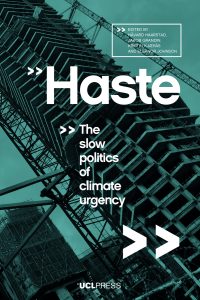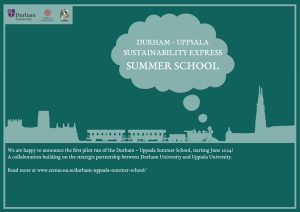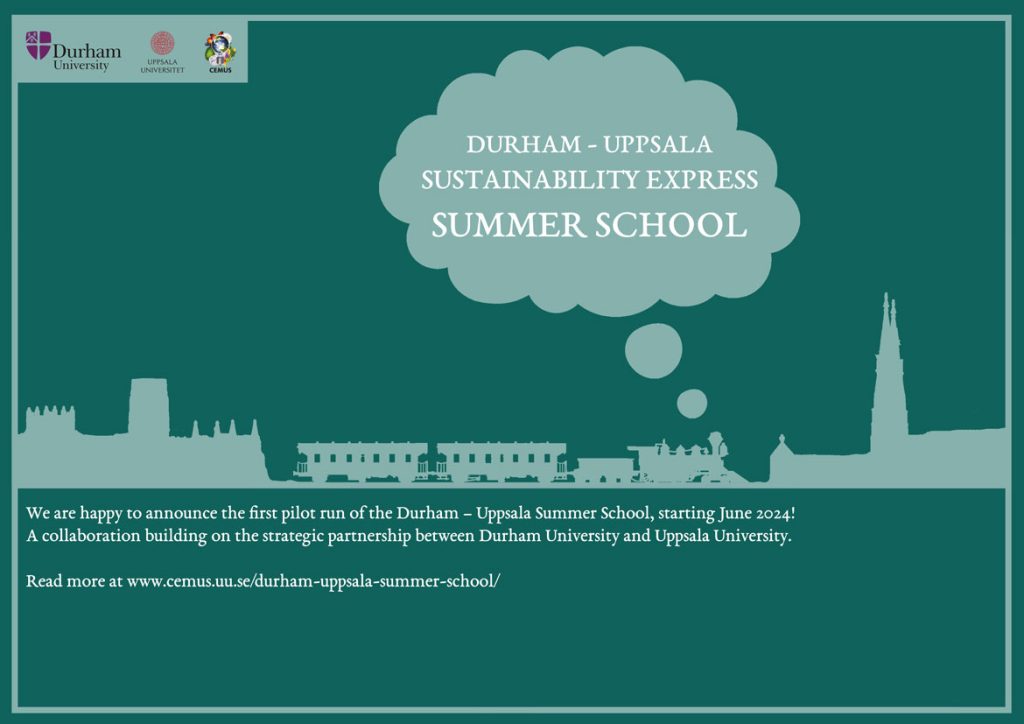We are happy to announce the first pilot run of the Durham – Uppsala Summer School, starting June 2024! A collaboration building on the strategic partnership between Durham University and Uppsala University.
When: June 3-9, 2024
Where: Uppsala, Sweden
Contact: Daniel Mossberg, CEMUS, Uppsala University +46-730650228 and Robert Song, Professor, Durham University
Study material and inspiration
 Haarstad, H., Grandin, J., Kjærås, K. & Johnson, E. (eds.) (2023). Haste: the slow politics of climate urgency. London: UCL Press. Free access here: https://discovery.ucl.ac.uk/id/eprint/10162046/1/Haste.pdf
Haarstad, H., Grandin, J., Kjærås, K. & Johnson, E. (eds.) (2023). Haste: the slow politics of climate urgency. London: UCL Press. Free access here: https://discovery.ucl.ac.uk/id/eprint/10162046/1/Haste.pdf
Practical information
Wifi at Uppsala University: as a visitor you can connect to the wifi called UU-Guest anywhere on the university’s premises, you are connected for 24 hours. A smart phone where you can get your login information is required.
Guest cards for student nations – students at universities in other countries or other cities in Sweden may buy a guest card (temporary membership) to get access to the student nations of Uppsala and their great range of activities. Read more: https://www.kuratorskonventet.se/guestcards
Locations in [brackets] in program – click for maps and see below.
Program
Monday June 3 arriving evening Uppsala
Tuesday June 4
Time |
Program |
| Morning | Breakfast [Botanika Hotel] |
| 08.45-10.00 | Hike with Daniel (around 1 hour, wide walkway) or bus (15 minutes) see https://www.ul.se/en for times, search for “Skolgatan” to “Gamla Uppsala” [Walking to Gamla Uppsala] |
| 10.15-12.00 | Guided tour and conversation with Anneli Ekblom, Professor at Department of Archaeology and Ancient History, program coordinator of the Environmental History Master Programme, Uppsala University and long-time CEMUS friend |
| Lunch | Lunch and outside time at Gamla Uppsala [Gamla Uppsala] |
| After lunch | Open program – time to explore your way back to Uppsala |
| 18.00- | Williams Pub for after work drinks and food |
| Evening | Student-organized social or open program |
Wednesday June 5
Time |
Program |
| Morning | Breakfast [Botanika Hotel] |
| 9.15-10.00 | Presentation and workshop on Student-Led Education, Interdisciplinarity, Sustainability and more at CEMUS with Daniel Mossberg, Lead Outreach and Educational Coordinator CEMUS [CEMUS, Geocentrum, Villavägen 16, 75236 Uppsala] |
| 10.15-11.45 |  Carbon Scapes with Magdalena Kuchler, Senior Lecturer/Associate Professor, Department of Earth Sciences, Uppsala University. Carbon Scapes with Magdalena Kuchler, Senior Lecturer/Associate Professor, Department of Earth Sciences, Uppsala University.Caught between Conservation and Transformation: Locating Rural Communities in the Sustainable Transition with Eva Rüskamp, Research Associate & Doctoral Candidate, Department of North American Cultural Studies, University of Freiburg. [CEMUS, Geocentrum, Villavägen 16, 75236 Uppsala] |
| 11.45-13.00 | Lunch at Café Victoria, Botanical Garden [Café Victoria, Botanical Garden] |
| 13.00-13.15 | Meet and greet CEMUS course coordinators and students [CEMUS, Geocentrum, Villavägen 16, 75236 Uppsala] |
| 13.15-15.00 |  Baking circle – Bread and Circuses, and … “Haste: the slow politics of climate urgency” on slowing down and speeding up with one of the editors of the book, Jakob Grandin, that did his research at SpaceLab, Department of Geography and the Centre for Climate and Energy Transformation and UiB Collaboratory, University of Bergen. Jakob will be joining us online from Bergen.
[CEMUS, Geocentrum, Villavägen 16, 75236 Uppsala] Baking circle – Bread and Circuses, and … “Haste: the slow politics of climate urgency” on slowing down and speeding up with one of the editors of the book, Jakob Grandin, that did his research at SpaceLab, Department of Geography and the Centre for Climate and Energy Transformation and UiB Collaboratory, University of Bergen. Jakob will be joining us online from Bergen.
[CEMUS, Geocentrum, Villavägen 16, 75236 Uppsala] |
| 18.30 | Dinner inside [Restaurang Koh Phangan, Fyristorg 2, 753 10 Uppsala] |
Thursday June 6 – Sweden’s National Day
Time |
Program |
| Whole day and evening | Open day [Uppsala or Stockholm] |
Friday June 7
Time |
Program |
| 10.15-11.15 |  Guided tour of Botanical Garden
[Tropical Greenhouse, Botanical Garden, Villavägen 8, 752 36 Uppsala] Guided tour of Botanical Garden
[Tropical Greenhouse, Botanical Garden, Villavägen 8, 752 36 Uppsala] |
Saturday June 8
Time |
Program |
| 12.00-13.30 | Session with Simona Capisani, Assistant Professor of Environmental Philosophy, Durham University, and Robert Song, Professor in the Department of Theology and Religion, Durham University [Botanika Hotel] |
| 14.00- | The Campus Garden joint gardening meet-up – every Saturday at 14 [The Campus Garden, Villavägen 14, 75236 Uppsala] |
| Late afternoon | Pizza dinner – party at CEMUS [CEMUS, Geocentrum, Villavägen 16, 75236 Uppsala] |
Sunday June 9
Time |
Program |
| 10.15-12.00 | Conclusion and looking ahead [Uppsala] |
As part of the strategic partnership between Durham and Uppsala, a delegation visited Uppsala on 22-23 November 2023 to explore potential research and education collaborations between our two institutions. Several possibilities for research collaboration emerged from this, and one immediate educational outcome for a joint Durham – Uppsala summer school, based on the Durham Arts and Humanities Faculty commitment to teaching in the environmental humanities as part of its strategic commitment to Transformative Humanities, in order to strengthen further Durham and Uppsala’s education collaborations.
Concept
The summer school on environmental sustainability and the environmental humanities for Masters’ and doctoral level students to be held jointly with Uppsala students, held each summer for one week in Uppsala and one week in Durham. During 2024 a first pilot run is conducted with students and faculty from Durham travelling to Uppsala for a week.
Partner institutions
At Durham University the network for environmental humanities gathers together a wide range of staff across the arts and humanities and social sciences researching and teaching in the environmental humanities and delivers an MA for Environmental Humanities housed in the Arts and Humanities Faculty. At Uppsala University the Centre for Environment and Development Studies, CEMUS, have a long-standing centre devoted to interdisciplinary education as well as research and collaboration. Its particular emphasis is student-initiated education, in which students design courses to be taken for credit.
The summer school would be held with students studying together in both Uppsala and Durham. Some of the education would be classroom-based, while some would be field-based in and around Uppsala and Durham, with possible study visits and field trips. One distinguishing feature of this would be travelling by train between Durham and Uppsala. Although air travel is the customary means of transport because it is both quicker and cheaper, travelling by train allows students to make the journey itself part of the education: some of the travel time would be actively devoted to shared learning, and the different experience of space and time that results, models a slower, more engaged relationship with the environment, as well as being less carbon intensive.
Learning outcomes
For students, while the summer school would not be credit-bearing, the educational benefits would include experience of cross-cultural education, learning from peers, and understanding how environmental issues are understood and approached in different geographical contexts. Drawing on CEMUS’s student-initiated emphasis, we also propose that students from Uppsala and Durham work together in the months leading up to the summer school to design a programme which would reflect their shared interests and would help them develop pedagogically-related skills in communication, digital literacy, group work, course design, and project development.



